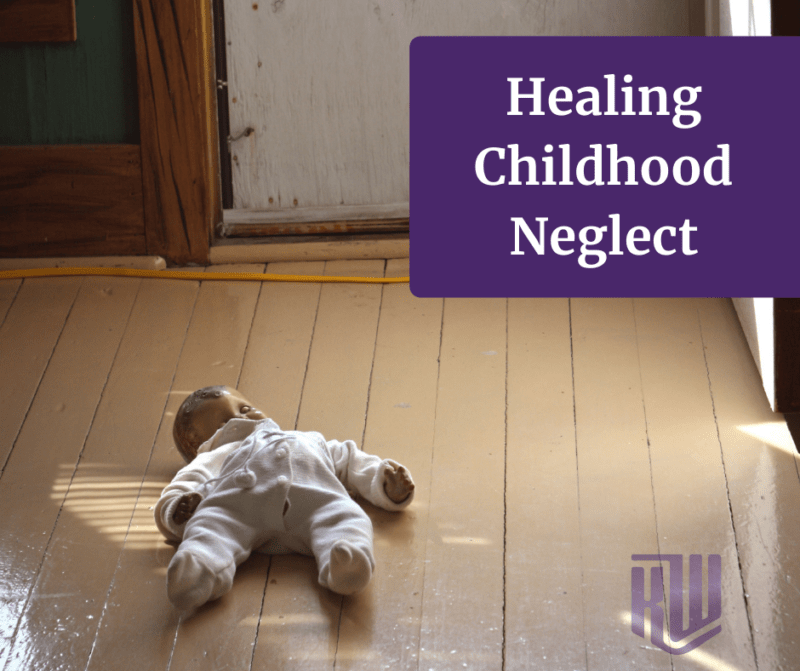Childhood emotional neglect is experienced as a lack of care, concern, or response to your feelings as a child. It can feel as though your parents:
1- Didn’t notice that you had feelings
2- Didn’t take the time to acknowledge them
3- Or even shamed you for having them.
As an adult,
we then carry this trauma through our interactions and shame ourselves for experiencing feelings. or might ignore them altogether. This can lead to health and relationship problems and an inability to recognize or process emotions properly.
It’s not always malicious or intentional and to some level, we’ve all experienced it. It’s useful to remember that parents are perfectly imperfect people with obligations, responsibilities, and, often, not a lot of free time.
And so through trying to multitask or look after a sibling or keep the house clean, they may not have been present for your feelings.
sort of unintentional neglect
This sort of unintentional neglect isn’t always recognizable until later in life and I certainly only realized in my adult life that I too have experienced this as a child.
A memorable instance was from a time I was unable to discuss with my parents how something my mother had done had affected me.
In this particular example, my mother, who was an alcoholic, had deeply embarrassed me and my family at an important meal and for me, it was a very difficult situation to process.
While my father was able to speak about this with other adult members of the family, if I tried to share how I felt about it I was shut down – the topic was off-limits. This is a primary way that emotional neglect is experienced – the inability to speak about certain topics.
However, there are ways that you can heal this sort of emotional neglect from childhood and in this article, we’ll look at 7 ways that you can do just that.
#1 – Discover and validate your needs and wants
When you can’t talk about certain things, you don’t know or understand your needs and wants.
With my specific experience, I wasn’t allowed to say to my Dad ‘I don’t want to go because Mom will be embarrassing’ – my feeling unsure or unhappy had no bearing on the outcome of the situation.
Experiences like this can lead us to feel that our voice and our feelings are insignificant, and can mean we will learn to never ask for what we want or need as an adult.
I’ve done a video called ‘Codependence Recovery – How to ask for your needs and wants’ which helps you learn how to start understanding what your needs and wants are and how to start asking for them.
#2 Self-Care
In moments of emotional neglect as a child, you often have to give away your self-care. Again, this is you not having a choice of what to do or how to spend your time .
It is all decided for you. To heal from this sort of neglect, self-care that does not include others is a priority. Often, self-care suggestions can include activities that involve others .
chatting with friends, organizing holidays, etc. – but by doing this you are once again relying on someone else to ultimately provide your needs for you.
To heal emotional neglect, doing daily self-care will help to nurture and bring you joy from within. This says to your mind ‘I am worthy.
I want or need this and I will provide it for myself’. It doesn’t matter how small the act of self-care is, as long as it’s something that ‘fills your tank’ and brings you joy each day.
#3 Don’t assume, gather information
As a child we’re not able to voice our feelings, so instead of talking through what we think is happening with our parents or others, we make assumptions in our minds.
This means that as an adult if, for example, your partner is doing something that you’re unsure about, you may not ask them about it.
Instead, as you did as a child, you might make up scenarios and assumptions in your mind that could be incorrect.
Remember, adults in your life now are all dealing with the same pain from the past and many are trying, like you, to heal. When we assume something.
Instead of assuming, ask! Stop and say ‘Can I have some clarity – what did you mean by this, why did you do this.
Pause and try to steer clear of making up what you assume they mean – gather information and ask for clarity.
#4 Make requests for care and love
When you are shut down when asking for love and affection as a child, you’ll carry this on through to adulthood. This experience can lead many to think ‘What’s the point in asking?’.
This shaming or dismissal of your feelings can mean you’ll find that you’re not able to voice what your emotional needs and wants are in adulthood, especially with someone you are very close with.
So, try this with people who you’re not as close to first, because if you start asking these requests from those closest to you and get rejected, you’ll wind up feeling even worse.
By requesting for your wants and needs to mete someone who’s not as close to you. It’s less likely to be as painful if they can not meet them.
It will feel less like a rejection that comes from the place of your trauma. Then, work your way up to those closer and closer to you.
#5 Learn to say no
As a child, you’re not often able to say no to things your parents want you to do. Which means in adult life it can be very difficult for you to feel as though you have permission to say no to things that don’t serve you.
For example, being with an emotionally or physically abusive spouse can be due to an inability to say no to things you don’t want in your life .
you will often tend to put people in your life in an authoritative position. It’s why many people with emotional neglect issues can end up with narcissists.
Remember, it doesn’t make you weak to be unable to stand up for yourself- as you learn more, you can do more to heal and more to stand up for yourself.
If you have grown up in this sort of environment, it’s not easy to stand up for yourself and it’s not something to blame yourself for.
However, it is your responsibility to do the work to break the cycle and you can learn more about how to say no with this video: How To Say No to Anyone Without Feeling Guilty.
#6 Learn to rage
When we are taught the message that we shouldn’t feel, we stuff rage down. Being embarrassed by my mother, for example – and having no one to talk to about this.
Being unable to share my feelings with my father or talk them through was a suppression of my feelings and neglect of my emotions.
Rage was not something I was able to express as a child, and this is often the case in many families that haven’t learned how to work through their own traumas.
Learning to let the rage out through physical acts – hitting a punching bag, shouting, allowing yourself to feel angry. And learning that it is ok for you to feel this way when you need to will help you to heal from this neglect.
#7 Learn to grieve
Learn to feel sadness. There are likely to have been many experiences of grief and sadness in your life that you may be holding on to.
Giving yourself permission to feel this is important for your growth.
To heal this, it can help to learn to re-parent yourself. Talk, journal, or meditate on how you feel and say to yourself the things you wish someone had said to you when you were younger.
It’s not possible to recover from childhood emotional neglect without dealing with the emotional pain and sadness .
you cannot keep suppressing these feelings, even though they’re difficult to work through – take time and go easy on yourself as you journey through this.
If you would like to learn more about childhood emotional neglect here are some videos to help you:
1- ‘What are the Signs of Emotional Neglect’
2- ‘Codependence Recovery: How to Ask For Your Needs and Wants’
3- ‘How to Say No Without Feeling Guilty’
Are you looking for more solutions? Pick the one that suits your needs best!
1- My Book, Your Journey To Success
2- My Complete Emotional Authenticity Method
3- My Perfectly Imperfect Private Group
4- My Private Coaching
To learn more watch the video:




